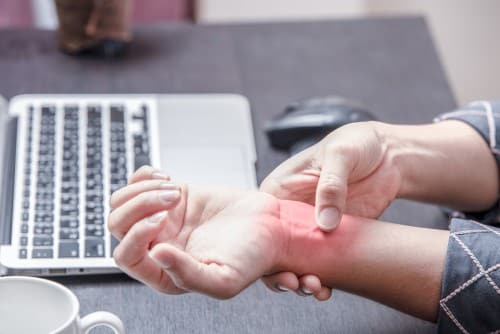Have you ever been seated with your legs crossed for too long and noticed your foot has ‘fallen asleep’? That tingling, numb sensation is a classic example of a pinched nerve. It is rather common to experience a mild example of a pinched nerve like this and usually repositioning your body is all it takes for the pressure on the nerve to ease and for normal feeling to return. However, there are other types of pinched nerves that do not resolve as quickly and may require you to seek medical treatment from an orthopedic surgeon. Orthopedic doctors and surgeons specialize in the spine and joints, which affect the whole body, so they are highly skilled in addressing pinched nerves and their effects on various parts of the body.
Symptoms of a Pinched Nerve
A mild experience of a pinched nerve can include tingling and numbness, often described as ‘pins and needles’, and can go away quickly. Other symptoms of a pinched nerve may last longer or reoccur over days or weeks at a time, which is a signal that you need to see an orthopedic doctor right away. These symptoms include muscle spasms, shooting pain, weakness or pain in muscles, and decreased sensation in the affected area. In severe cases of a pinched nerve, you could begin to lose the use of one of your extremities, like an arm or leg.
Causes of a Pinched Nerve
There are many examples of how a pinched nerve can occur and also lead to other conditions that affect the nervous system and the musculoskeletal system, from more mild causes such as chronic poor posture to nerve damage from a car accident injury. A nerve can be compressed by nearby bone, muscle, joint, or other soft tissues.
Poor Posture
 If you sit at a desk all day, you might have what many call ‘tech neck’. This is a description of how our bodies hunch over our keyboards or other devices, leading to an unnatural curve in the spine and neck. Poor posture such as this can lead to a pinched nerve when the spine is misaligned.
If you sit at a desk all day, you might have what many call ‘tech neck’. This is a description of how our bodies hunch over our keyboards or other devices, leading to an unnatural curve in the spine and neck. Poor posture such as this can lead to a pinched nerve when the spine is misaligned.
Spinal Misalignment
Spinal misalignments are a frequent cause of disruptions in the nervous system because the spinal column houses all the nerves in the nervous system. When a vertebra is slightly out of place or misaligned, it can cause a disruption of the nerves. One way can be through increased pressure and compression on a particular nerve, which is a pinched nerve.
Herniated Disc
An example of a spinal disc compressing on a nerve is a herniated disc, where a misalignment causes a spinal disc to rupture and compress a nearby nerve root. Similarly, when the sciatic nerve is compressed by a herniated disc it causes shooting pains along the lower half of the body.
Carpal Tunnel Syndrome
Carpal Tunnel Syndrome is commonly understood in the context of repetitive overuse of the hand and wrist, through writing, typing, and other common daily motions. This condition occurs when a specific nerve, the median nerve, is compressed and leads to tingling, numbness, and weakness in the hand and wrist.
Rheumatoid Arthritis
Pinched nerves can also be caused by inflammation in the soft tissues near the nerve. This is very common with those who suffer from rheumatoid arthritis. When the soft tissues around your joints become inflamed, this can compress nerves in the area and lead to significant pain and discomfort. That’s why one of the common symptoms of rheumatoid arthritis is a tingling sensation and numbness around the joints.
Nerve Damage
Perhaps one of the most severe cases of pinched nerves can lead to nerve damage because the nerve is not just compressed but even more severely damaged. This type of nerve damage can occur in injuries suffered by blunt force trauma such as a serious car accident.
Treating a Pinched Nerve
Mild cases of a pinched nerve may go away on their own after your body adjusts to naturally remove pressure off of the affected nerve. However, in moderate to severe cases of pinched nerves, you may experience an increase in the severity of symptoms over the course of days of weeks, leading you to seek treatment from a doctor. Orthopedic doctors and surgeons treat pinched nerves in a variety of ways depending on the location and severity of the pinched nerve. Orthopedic doctors and surgeons frequently utilize a combination of a physical exam and diagnostic imaging tools to identify the affected nerves and develop a treatment plan accordingly.
Because a pinched nerve in one area can cause pain and discomfort in multiple areas of the body, it is important to receive treatment from a highly experienced and knowledgeable orthopedic doctor to receive the comprehensive care you deserve. Your particular situation may call for more conservative treatment to reduce inflammation in the area or nerve-related testing before it leads to anything chronic. From herniated discs to rheumatoid arthritis, AICA orthopedic surgeons develop an individualized treatment plan that works for you and your body so you can experience pain relief and healing.


